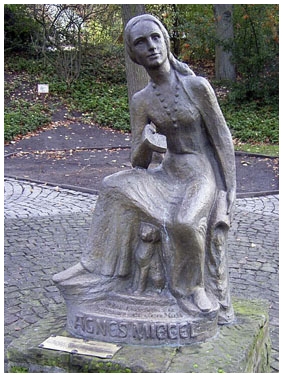
Emil Erich Kästner was a German writer, poet, screenwriter and satirist, known primarily for his humorous, socially astute poems and for children's books including Emil and the Detectives. He received the international Hans Christian Andersen Medal in 1960 for his autobiography Als ich ein kleiner Junge war. He was nominated for the Nobel Prize in Literature in six separate years.

Agnes Miegel was a German author, journalist and poet. She is best known for her poems and short stories about East Prussia, but also for the support she gave to the Nazi Party.

Louis Kugelmann, or Ludwig Kugelmann, was a German gynecologist, social democratic thinker and activist, and confidant of Marx and Engels.
Friedrich Blume was professor of musicology at the University of Kiel from 1938 to 1958. He was a student in Munich, Berlin and Leipzig, and taught in the last two of these for some years before being called to the chair in Kiel. His early studies were on Lutheran church music, including several books on J.S. Bach, but broadened his interests considerably later. Among his prominent works were chief editor of the collected Praetorius edition, and he also edited the important Eulenburg scores of the major Mozart Piano Concertos. From 1949 he was involved in the planning and writing of Die Musik in Geschichte und Gegenwart.

Heinrich Fink was a German theologian, university professor and politician. In 1991 Fink was dismissed from Humboldt University of Berlin due to allegations against him being a former informer for the East German state security office, the Stasi. Fink denied the allegations.

Erich Kamke was a German mathematician, who specialized in the theory of differential equations. Also, his book on set theory became a standard introduction to the field.
Otto Schrader was a German philologist best known for his work on the history of German and Proto-Indo-European vocabulary dealing with various aspects of material culture, such as the names of domesticated plants and animals, the names of the metals, etc.

Karl Matthias Friedrich Magnus Kraepelin was a German naturalist who specialised in the study of scorpions, centipedes, spiders and solfugids, and was noted for his monograph Scorpiones und Pedipalpi (Berlin) in 1899, which was an exhaustive survey of the taxonomy of the Order Scorpiones. From 1889 to 1914, he served as the Director of the Naturhistorisches Museum Hamburg, which was destroyed during World War II, and worked on myriapods from 1901 to 1916.
Heinrich Schmidt was a German archivist, naturalist, philosopher, professor and a student of Ernst Haeckel.

Bernhard Kummer was a Germanist who was appointed to a professorship in the Nazi era and whose writings have been influential among postwar neo-Nazis. He was a prominent representative of Nordicism, the view that the so-called Nordic race was inherently culturally advanced, and in books including his best known work, Midgards Untergang, he argues that the conversion of the Germanic peoples from their native Germanic paganism, particularly the Christianisation of Scandinavia, was detrimental to European culture.
Schlesische Arbeiter-Zeitung was a left-wing German language newspaper published from Breslau, Province of Lower Silesia, Weimar Germany between 1919 and 1933.
Hermann Budzislawski was a German journalist with a particular focus on economics and politics, who used the pseudonyms Hermann Eschwege and Donald Bell. As a young man in the 1930s, he came to prominence as editor in chief of the political weekly magazine Die Weltbühne during the publication's period in exile. After 1945, he returned from a period of several years in New York City to resume his journalistic work and to become a radio commentator with Mitteldeutscher Rundfunk, based in Leipzig, where he also now pursued a successful career as a professor of media sciences at the university.
Bernhard Schweitzer was a German classical archeologist.
Friedrich Lütge was a German economist, social historian and economic historian.
Walther Schoenichen was a German biologist and a prominent proponent of nature conservation within Nazi Germany.
Norbert Frei is a German historian. He holds the Chair of Modern and Contemporary History at the University of Jena, Germany, and leads the Jena Center of 20th Century History. Frei's research work investigates how German society came to terms with Nazism and the Third Reich in the aftermath of World War II.
Wolfgang Schultz was an Austrian philosopher who served as Professor and Chair of Philosophy at the Ludwig Maximilian University of Munich.
Fritz Reuter was a German musicologist, music educator, composer and Kapellmeister. Reuter was one of the most important German music educators of the 20th century. After studying music and musicology in Dresden and Leipzig, with Teichmüller, Riemann, Schering and Abert, he received his doctorate in 1922. In 1945, he was appointed Kapellmeister at the Volksoper in Dresden. In 1949, he was appointed as the first professor of music education at a German university. He was also director of institutes at the Martin Luther University of Halle-Wittenberg and the Humboldt University Berlin. In 1955, he was one of the initiators of the first Hallische Musiktage.
Rudolf Kötzschke was a German historian who founded the Seminar for Regional History and Settlement Studies in Leipzig, the first regional history institution at a German university.

Maria Karoline Elisabeth Grollmuß was a Catholic Sorbian publicist and a socialist resistance member against the Nazi government.








